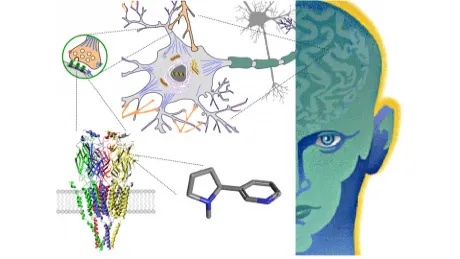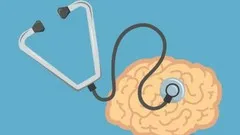
Drugs and the Brain 
This course explores the neuroscience of drugs, from therapeutic uses to recreational use and addiction. It examines the potential of new medications for neurology, psychiatry, aging, and substance abuse treatment. ▼
ADVERTISEMENT
Course Feature
![]() Cost:
Cost:
Free
![]() Provider:
Provider:
Coursera
![]() Certificate:
Certificate:
No Information
![]() Language:
Language:
English
![]() Start Date:
Start Date:
1st Oct, 2016
Course Overview
❗The content presented here is sourced directly from Coursera platform. For comprehensive course details, including enrollment information, simply click on the 'Go to class' link on our website.
Updated in [March 06th, 2023]
Drugs and the Brain is a course that explores the neuroscience of drugs for therapy, prevention, and recreation. Students will gain an understanding of drug addiction and drug abuse, as well as the prospects for new generations of medications in neurology, psychiatry, aging, and treatment of substance abuse. Through this course, students will gain an understanding of the effects of drugs on the brain and how they can be used to treat various conditions. Additionally, students will learn about the potential risks associated with drug use and abuse.
[Applications]
After this course, students are encouraged to apply their knowledge to research and develop new treatments for neurological and psychiatric disorders, as well as to explore the potential of drugs for prevention and recreation. They can also use their understanding of drug addiction and drug abuse to develop strategies for prevention and treatment. Additionally, students can use their knowledge to evaluate the safety and efficacy of new medications and to explore the implications of drug use in society.
[Career Paths]
1. Clinical Psychologist: Clinical psychologists specialize in diagnosing and treating mental health issues, such as addiction, depression, and anxiety. They use a variety of techniques, such as cognitive-behavioral therapy, to help their patients. With the increasing prevalence of drug abuse and addiction, clinical psychologists are in high demand.
2. Neuroscientist: Neuroscientists study the brain and nervous system to understand how drugs affect the body. They use a variety of techniques, such as brain imaging, to study the effects of drugs on the brain. As the understanding of the brain and its relationship to drug use continues to grow, neuroscientists are in high demand.
3. Drug Counselor: Drug counselors provide support and guidance to individuals struggling with addiction. They use a variety of techniques, such as cognitive-behavioral therapy, to help their clients. With the increasing prevalence of drug abuse and addiction, drug counselors are in high demand.
4. Pharmaceutical Researcher: Pharmaceutical researchers develop new drugs to treat a variety of conditions, including addiction. They use a variety of techniques, such as animal testing, to develop new drugs. As the understanding of the brain and its relationship to drug use continues to grow, pharmaceutical researchers are in high demand.
[Education Paths]
1. Neuroscience Degree: A neuroscience degree focuses on the study of the nervous system, including the brain, spinal cord, and peripheral nervous system. This degree path is ideal for those interested in understanding the biological basis of behavior, cognition, and emotion. With the development of new technologies, neuroscience is becoming increasingly important in the medical field, and graduates of this degree path can expect to find employment in research, clinical, and pharmaceutical settings.
2. Psychology Degree: A psychology degree focuses on the study of the mind and behavior. This degree path is ideal for those interested in understanding the psychological and social aspects of behavior, cognition, and emotion. With the development of new technologies, psychology is becoming increasingly important in the medical field, and graduates of this degree path can expect to find employment in research, clinical, and pharmaceutical settings.
3. Pharmacology Degree: A pharmacology degree focuses on the study of drugs and their effects on the body. This degree path is ideal for those interested in understanding the therapeutic and recreational effects of drugs on the body. With the development of new technologies, pharmacology is becoming increasingly important in the medical field, and graduates of this degree path can expect to find employment in research, clinical, and pharmaceutical settings.
4. Addiction Studies Degree: An addiction studies degree focuses on the study of addiction and its effects on individuals, families, and society. This degree path is ideal for those interested in understanding the causes and consequences of addiction, as well as the treatment and prevention of addiction. With the development of new technologies, addiction studies is becoming increasingly important in the medical field, and graduates of this degree path can expect to find employment in research, clinical, and pharmaceutical settings.
Course Provider

Provider Coursera's Stats at AZClass
Discussion and Reviews
0.0 (Based on 0 reviews)
Explore Similar Online Courses

Easy Embroidery Work

Digital Marketing for SMBs with Greg Gifford

Python for Informatics: Exploring Information

Social Network Analysis

Introduction to Systematic Review and Meta-Analysis

The Analytics Edge

DCO042 - Python For Informatics

Causal Diagrams: Draw Your Assumptions Before Your Conclusions

Whole genome sequencing of bacterial genomes - tools and applications

Control Your Subconscious Mind: Neuroscience Hidden Secrets

Perform an Excellent Neurological Bedside Exam

Brain and Behavioral Science Fundamentals
 Related Categories
Related Categories
 Popular Providers
Popular Providers
Quiz
 Submitted Sucessfully
Submitted Sucessfully
1. Which of the following is not a type of drug?
2. Which of the following is a type of drug abuse?
3. Which of the following is a potential benefit of drugs?


Start your review of Drugs and the Brain